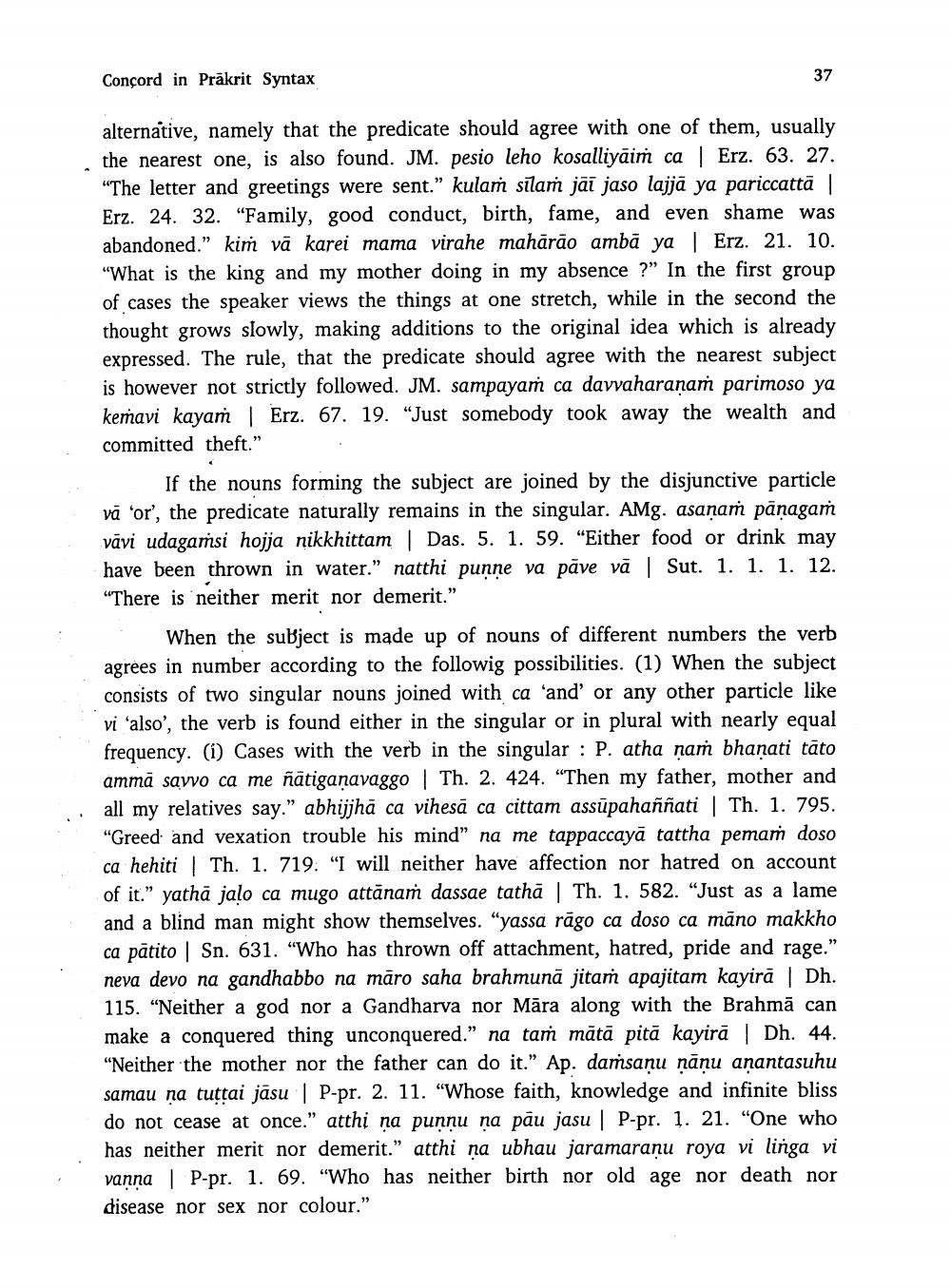________________
Concord in Prakrit Syntax
alternative, namely that the predicate should agree with one of them, usually the nearest one, is also found. JM. pesio leho kosalliyāim ca | Erz. 63. 27. “The letter and greetings were sent." kulam silam jai jaso lajjā ya pariccattā | Erz. 24. 32. "Family, good conduct, birth, fame, and even shame was abandoned." kim vā karei mama virahe mahārāo amba ya Erz. 21. 10. "What is the king and my mother doing in my absence ?” In the first group of cases the speaker views the things at one stretch, while in the second the thought grows slowly, making additions to the original idea which is already expressed. The rule, that the predicate should agree with the nearest subject is however not strictly followed. JM. sampayam ca davvaharanam parimoso ya kemavi kayam Erz. 67. 19. "Just somebody took away the wealth and committed theft.”
If the nouns forming the subject are joined by the disjunctive particle vā ‘or', the predicate naturally remains in the singular. AMg. asanam pāņagam vāvi udagamsi hojja nikkhittam Das. 5. 1. 59. "Either food or drink may have been thrown in water." natthi punne va pāve vā| Sut. 1. 1. 1. 12. "There is neither merit nor demerit."
When the subject is made up of nouns of different numbers the verb agrees in number according to the followig possibilities. (1) When the subject consists of two singular nouns joined with ca ‘and' or any other particle like vi ‘also', the verb is found either in the singular or in plural with nearly equal frequency. (i) Cases with the verb in the singular : P. atha nam bhanati tāto ammā savvo ca me ñātiganavaggo | Th. 2. 424. “Then my father, mother and all my relatives say." abhijjhā ca vihesā ca cittam assūpahaññati | Th. 1. 795. “Greed and vexation trouble his mind” na me tappaccayā tattha pemaṁ doso ca hehiti | Th. 1. 719. “I will neither have affection nor hatred on account of it.” yathā jalo ca mugo attānam dassae tathā | Th. 1. 582. “Just as a lame and a blind man might show themselves. “yassa rāgo ca doso ca mano makkho ca pātito | Sn. 631. “Who has thrown off attachment, hatred, pride and rage." neva devo na gandhabbo na māro saha brahmunā jitaṁ apajitam kayiră | Dh. 115. “Neither a god nor a Gandharva nor Māra along with the Brahmā can make a conquered thing unconquered.” na taṁ mātā pitā kayirā| Dh. 44. "Neither the mother nor the father can do it." Ap. damsanu nānu anantasuhu samau na tuttai jāsu | P-pr. 2. 11. "Whose faith, knowledge and infinite bliss do not cease at once." atthị na punnu na pau jasu P-pr. 1. 21. "One who has neither merit nor demerit.” atthi na ubhau jaramaranu roya vi linga vi vanna | P-pr. 1. 69. “Who has neither birth nor old age nor death nor disease nor sex nor colour."




